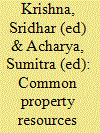|
|
|
Sort Order |
|
|
|
Items / Page
|
|
|
|
|
|
|
| Srl | Item |
| 1 |
ID:
095453


|
|
|
|
|
| Publication |
Hyderabad, ICFAI University Press, 2008.
|
| Description |
x, 247p.
|
| Standard Number |
9788131420263
|
|
|
|
|
|
|
|
|
|
|
|
Copies: C:1/I:0,R:0,Q:0
Circulation
| Accession# | Call# | Current Location | Status | Policy | Location |
| 054886 | 338.5/KRI 054886 | Main | On Shelf | General | |
|
|
|
|
| 2 |
ID:
082507


|
|
|
|
|
| Publication |
2008.
|
| Summary/Abstract |
This article presents the results of a field study undertaken in the province of Balochistan, Pakistan, to understand the experience and impact of an ongoing programme of transitioning from karez (an ancient mode of tapping groundwater) to tubewell irrigation on social equity, livelihoods, community cohesion and environmental quality. The article explores how changes in water management techniques and technologies are influenced by and, in turn, impact social power relations at various scales. Analyses of the field study results and policy context of groundwater management in Balochistan reveals that the transition from karez to tubewell irrigation was neither inevitable nor necessarily more advantageous but, rather, the outcome of deliberate policy choices by the government. The diffusion of tubewells is putting traditional communal modes of power in communities under stress and, in places, replacing them with the power of large farmers. At the policy level, the differential power of the discourse of modernization, coupled with the compensatory power of large farmers, is facilitating the rapid diffusion of tubewells in Balochistan. The transition from karez to tubewell irrigation also is having negative consequences for social equity and environmental quality. The article concludes by proposing specific policy initiatives that may help save and rehabilitate the rapidly dwindling karez irrigation in Balochistan
|
|
|
|
|
|
|
|
|
|
|
|
|
|
|
|
| 3 |
ID:
092827


|
|
|
|
|
| Publication |
2009.
|
| Summary/Abstract |
As a part of the ongoing power sector reforms in India, the state of West Bengal is in the process of metering agricultural electricity supply. This paper presents a first cut assessment of this initiative. Results suggest that the majority of the pump owners benefit from the reforms in two ways: first by having to pay a lower electricity bill for same usage and second through increased profit margins by selling water. This is because in response to the changed incentive structure, water prices rose sharply by 30-50% immediately after metering. In contrast, water buyers have lost out by having to pay higher water charges and face adverse terms of contract. Impact of metering on operation of groundwater markets and volume of groundwater extracted is less clear; they may expand, contract or remain unchanged, though water use efficiency is likely to go up. At current tariff rates, the electricity utilities are likely to earn less revenue than before. These findings are context specific and hold good for West Bengal where high flat tariff had fostered competitive groundwater markets and hence cannot be generalised for other Indian states.
|
|
|
|
|
|
|
|
|
|
|
|
|
|
|
|
|
|
|
|
|